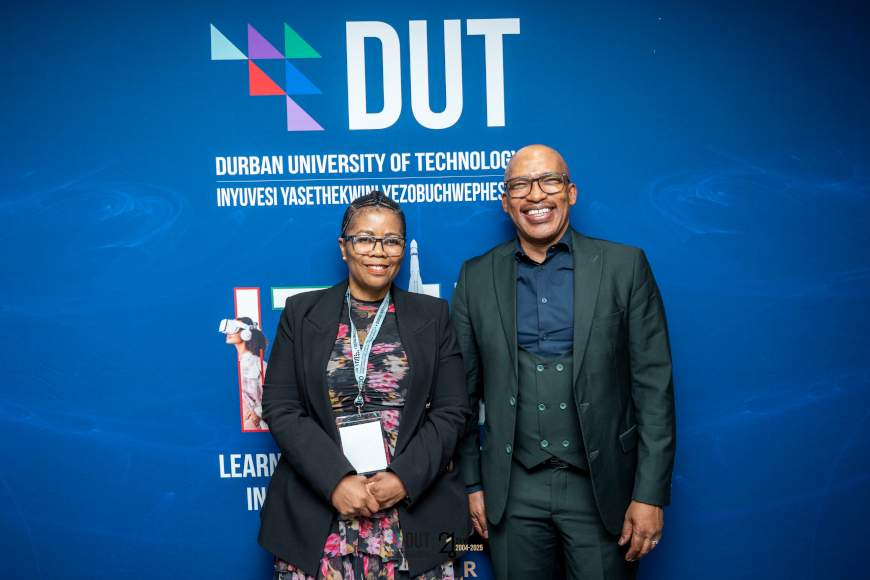Under the theme of: Converging Horizons: Transformative Education, Research and Innovation, the Learning, Teaching, Research, Innovation and Engagement (LTRIE) Conference is fostering critical discussions that contribute to shaping the future of higher education in Africa and beyond. The prestigious LTRIE Conference commenced at Coastlands Umhlanga on Monday, 27 October 2025 and concluded on Thursday, 30 October 2025.
Scholars, researchers, practitioners, students, community partners formed part of the esteemed LTRIE Conference which also included academic delegates such as the Vice-Chancellor and Principal, Professor Thandwa Mthembu, Deputy Vice Chancellor: Research, Innovation and Engagement, Prof Fulufhelo Nemavhola, Professor Wayne Hugo (UKZN), Executive Dean: Faculty of Applied Sciences, Prof Suren Singh, Professor Vusi Gumede, Deputy Vice-Chancellor: Teaching and Learning, Professor Gugu Mchunu, Executive Dean in the Faculty of Health Sciences, Dr Nomcebo Mthombeni, Interim Director: Research and Postgraduate Support at DUT, DUT’s Professor Livingstone Makondo, Prof Pavitra Pillay, Deputy Dean of the Faculty of Health Sciences, and Acting Director: Centre for Excellence in Learning and Teaching (CELT), Dr Shoba Rathilal.
The highlight of day three of the exhilarating LTRIE Conference saw the dynamic Professor Puleng LenkaBula, Principal and Vice-Chancellor of UNISA delivered a compelling keynote address titled: “Propelling Universities as sites of transformation and societal change.” Her topic of discussion strongly highlighted the transformation of academia.
She thanked the Vice-Chancellor and Principal, Professor Thandwa Mthembu for creating an enabling environment for scholars, academics, professionals, locals and internationals, to address the key areas of interests as South African universities, African universities, on the issues of transformation in a changing world.
“Although I was not able to be here since the beginning of the conference, I followed some of the insightful discussions of the conference and the various themes that in the past two days have been engaged with, I’m quite appreciative that some of the sub themes are very interesting sub themes that all universities in our country must contend with,” she shared.
Prof LenkaBula elaborated on some of the sub themes such as the transformative pedagogies and disruptive curricula for complex futures, Artificial Intelligence (AI) data, and graduate adaptiveness. “I think these themes indicate the creative engagement with the role of universities as key sites of transformation,” she indicated.
She articulated into the role of social scientists and natural scientists which has always been with deep engagement with social change, with societal change, saying that it is not different for this generation of scientists.
Prof LenkaBula indicated that to transform society, it means investing in the developments that societies and countries must invest in. “I say this because there are multiplicities of lost innovations and investments that this country could have made, or which would have propelled the contributions of universities in our society,” she voiced.
She articulated on the value of obtaining a PhD which is vital in an academic setting.
“After 31 years of investment in higher education, we have no reason not to have PhDs if we want to teach in a university. We have no reason because there’s financing for our studies and financing for research. I’m inviting all young scholars or early career scholars to know that a PhD is a basic in an academic setting. It allows you to strengthen your research to speak with your voice, to ensure that your inquiry-based learning or even the innovation and impact that you’re doing is respected across the board. This is not to create a hierarchy, but an invitation if you are to be partners in the transformation and the impact to our society that you pursue and complete your PhD,” she said.
She highlighted that it is an important imperative for Africans to strengthen the research arena so that collaboration and future-oriented thinking is based on one’s own innovations, and not what is drawn from others. She concluded her reflections saying that universities must be at the centre of humanising philosophies, civilisations, democracies and multilateral relations.
“If we are to be impactful in our society we must design educational systems practices and transformative mechanisms that are inclusive even for those on the underside,” concluded Prof LenkaBula.
Further on into the programme of the day, lead talkers, Prof Wayne Hugo from the University of KwaZulu-Natal shared his academic talk on technologies and knowledge futures, focusing on Artificial Intelligence (AI), data and decoloniality in practice. Professor Kasturi Behari-Leak, who hails from the University of Cape Town, highlighted her presentation on transformative pedagogies and disruptive curricula for complex futures. This was followed by a robust panel discussion with executive deans from DUT on the issue of transformation and what the university can do to make it better. Day three concluded with compelling presentations of academic papers pertaining to research for societal transformation and transformative pedagogies and disruptive curricula for complex futures.
On the final day, Thursday, 30 October 2025, Prof Molebatsi Nkoane from the Central University of Technology delivered his keynote address titled: From Disruption to Convergence: Rethinking Higher Education through Innovation, Engagement and Critical Praxis. Prof Nkoane emphasised that universities needed to visualise and to implement critical praxis to guide strategic initiatives.
The LTRIE Conference concluded with the final academic presentations, covering some thought-provoking topics pertaining to using language as a resource for teaching and learning to enhance student success, the effects of cyberbullying on students living in student residences, and leveraging Artificial Intelligence (AI) for learning without compromising integrity.
Pictured: Professor Puleng LenkaBula, Principal and Vice-Chancellor of UNISA and DUT Vice-Chancellor and Principal, Professor Thandwa Mthembu, at the LTRIE Conference.
Photography: S’bonelo Dlamini
Waheeda Peters

